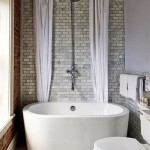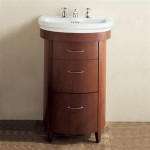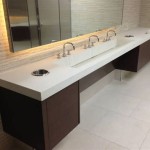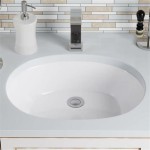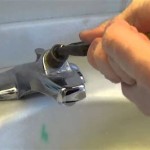What Material Is Best For A Bathroom Countertop?
Selecting the ideal material for a bathroom countertop involves careful consideration of factors such as durability, aesthetics, maintenance requirements, and budget. The bathroom environment, characterized by fluctuating humidity levels and frequent exposure to water, cleaning agents, and personal care products, necessitates a countertop material that can withstand these conditions while complementing the overall design of the space.
Several materials are commonly employed for bathroom countertops, each possessing unique advantages and disadvantages. These include natural stone options like granite and marble, engineered stones such as quartz, solid surface materials, laminates, tile, concrete, and even wood in certain applications. Understanding the properties of each material is crucial for making an informed decision that aligns with individual needs and preferences.
Durability and Water Resistance
Durability is a primary concern when selecting a bathroom countertop material. The countertop must be able to resist scratches, stains, chips, and cracks from everyday use. Water resistance is equally important, as the material will be constantly exposed to moisture. Porous materials can absorb water, leading to staining, mold growth, and eventual degradation.
Granite is a naturally durable and water-resistant option. When properly sealed, it is resistant to stains and scratches and can withstand high temperatures. However, granite is a porous material and requires periodic sealing to maintain its integrity. The frequency of sealing depends on the type of granite and the level of use.
Quartz, an engineered stone made from crushed quartz crystals and resin, is highly durable and non-porous. It is resistant to scratches, stains, and heat, making it a low-maintenance option. The non-porous nature of quartz also inhibits the growth of bacteria and mold, which is a significant advantage in a bathroom environment. Quartz is generally considered more durable than granite.
Marble, known for its elegant appearance, is relatively soft and porous compared to granite and quartz. It is susceptible to scratches, stains, and etching from acidic substances such as lemon juice and toothpaste. Marble requires more frequent sealing and careful maintenance to preserve its beauty. Despite its vulnerability, marble remains a popular choice due to its aesthetic appeal and unique veining patterns.
Solid surface materials, such as Corian, are non-porous and seamless, making them highly resistant to water and stains. They are also repairable; scratches and stains can often be sanded out. However, solid surface materials are generally less heat-resistant than granite or quartz and can be susceptible to scratching.
Laminate countertops consist of a thin layer of decorative plastic laminated to a particleboard or plywood core. They are relatively inexpensive but are not as durable as other options. Laminate is susceptible to scratches, water damage (especially at seams), and peeling. It is a suitable choice for budget-conscious projects but may require replacement sooner than other materials.
Tile countertops offer a wide range of design possibilities but can be challenging to maintain. The grout lines are porous and prone to staining and mold growth, requiring frequent cleaning and sealing. While individual tiles may be durable, the overall countertop is susceptible to cracking if the underlying surface is not properly prepared.
Concrete countertops are durable and can be customized with various colors and finishes. However, concrete is porous and requires sealing to prevent staining. It can also be prone to cracking if not properly reinforced. The weight of concrete countertops can also be a consideration, requiring strong cabinet support.
Wood countertops offer a warm and natural aesthetic but are not ideal for bathroom environments due to their susceptibility to water damage. If wood is used, it must be properly sealed and maintained to prevent warping, cracking, and rot. Regular sealing and immediate cleanup of spills are essential.
Aesthetics and Design Considerations
The aesthetic appeal of a bathroom countertop is crucial for creating a visually pleasing and cohesive space. The countertop should complement the overall design style of the bathroom, whether it is modern, traditional, or eclectic. The color, pattern, and texture of the countertop material play a significant role in achieving the desired aesthetic.
Granite offers a wide variety of colors and patterns due to its natural formation. Each slab of granite is unique, providing a distinctive look. The veining and mineral inclusions add character and depth to the countertop. Granite is often chosen for its timeless elegance and compatibility with various design styles.
Quartz is available in a wide range of colors and patterns, including options that mimic the look of natural stone. Because it’s an engineered material, quartz offers consistent color and pattern throughout the slab, which can be advantageous for those seeking a uniform aesthetic. Quartz can also be manufactured with solid colors or unique designs, providing greater design flexibility.
Marble is prized for its luxurious appearance and distinctive veining patterns. The swirling patterns and subtle color variations add a touch of sophistication to any bathroom. However, the limited color palette and vulnerability to staining may be a drawback for some. While white and gray marbles are most common, marble is available in a variety of colors including black, green, and pink.
Solid surface materials are available in a wide range of colors and patterns, including options that mimic the look of granite or marble. The seamless nature of solid surface countertops allows for integrated sinks and backsplashes, creating a clean and modern look. They can also be thermoformed into various shapes and designs.
Laminate countertops offer a wide variety of colors and patterns at a relatively low cost. They can mimic the look of natural stone, wood, or other materials. However, the appearance of laminate may not be as authentic as natural stone or engineered stone.
Tile countertops offer endless design possibilities, allowing for the creation of unique patterns and mosaics. Tiles are available in a wide range of colors, sizes, and materials, including ceramic, porcelain, and glass. However, the grout lines can detract from the overall aesthetic if not properly maintained.
Concrete countertops can be customized with various colors, textures, and finishes. They can be stained, polished, or stamped to create a unique look. Concrete countertops are often chosen for their industrial aesthetic and versatility.
Wood countertops add warmth and natural beauty to a bathroom. They can be stained or sealed to enhance the natural grain and color of the wood. However, the vulnerability of wood to water damage limits its suitability for bathroom applications.
Maintenance and Cost Considerations
The maintenance requirements and cost of a bathroom countertop are important factors to consider. Some materials require more frequent cleaning and sealing than others. The initial cost of the material, as well as the cost of installation, should be factored into the overall budget.
Granite requires periodic sealing to prevent staining. The frequency of sealing depends on the type of granite and the level of use. Regular cleaning with a mild detergent is also recommended. The cost of granite varies depending on the quality and rarity of the stone. Installation costs can also be significant due to the weight and complexity of the material.
Quartz is a low-maintenance option that does not require sealing. Regular cleaning with a mild detergent is sufficient to keep it looking its best. The cost of quartz is generally comparable to granite, but can vary depending on the brand and color. Installation costs are similar to granite.
Marble requires more frequent sealing and careful maintenance to prevent staining and etching. It should be cleaned with a pH-neutral cleaner to avoid damaging the surface. The cost of marble varies depending on the quality and rarity of the stone. Installation costs are similar to granite and quartz.
Solid surface materials are easy to clean and maintain. They do not require sealing and can be cleaned with a mild detergent. Scratches and stains can often be sanded out. The cost of solid surface materials is generally lower than granite or quartz. Installation costs are also typically lower.
Laminate countertops are relatively inexpensive but require careful maintenance to prevent water damage. They should be cleaned with a mild detergent and dried immediately after use. The cost of laminate is significantly lower than other options. Installation costs are also lower.
Tile countertops require frequent cleaning and sealing of the grout lines to prevent staining and mold growth. The cost of tile varies depending on the material and design. Installation costs can be higher due to the complexity of the installation process.
Concrete countertops require sealing to prevent staining. They should be cleaned with a pH-neutral cleaner. The cost of concrete countertops can vary depending on the complexity of the design and the finish. Installation costs can also be significant due to the weight and the need for specialized tools.
Wood countertops require regular sealing and immediate cleanup of spills to prevent water damage. They should be cleaned with a mild detergent and dried immediately after use. The cost of wood countertops varies depending on the type of wood and the finish. Installation costs are similar to other countertop materials but may require additional sealing or finishing based on the particular wood used.

6 Best Bathroom Countertops Chic Countertop Materials
What Are The Best Materials For Bathroom Vanity Countertops Toulmin Kitchen Bath Custom Cabinets Kitchens And Design Remodeling In Tuscaloosa Birmingham Alabama
:strip_icc()/101963997-428f882f0c604f7cb5e07f81516e96d9.jpg?strip=all)
18 Luxurious Bathroom Countertop Ideas For All Budgets

Best Types Of Bathroom Countertops Modernize
:strip_icc()/102227038-7f5a5ef7c99948bd817d94db91e36084.jpg?strip=all)
18 Luxurious Bathroom Countertop Ideas For All Budgets

Choosing The Best Material For Bathroom Countertops Home Matters Ahs

What Are The Best Materials For Bathroom Vanity Countertops Toulmin Kitchen Bath Custom Cabinets Kitchens And Design Remodeling In Tuscaloosa Birmingham Alabama

5 Bathroom Countertops Best Materials In 2024

What Are The Best Surfaces For Bathroom Countertops

Best Stone Material For Upgrading Your Bathroom Countertop
Related Posts
